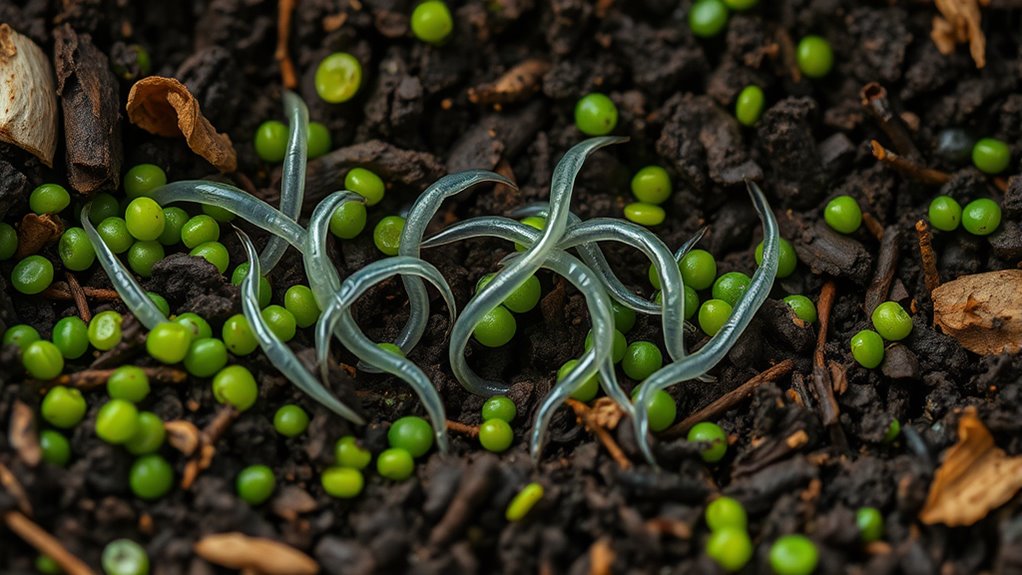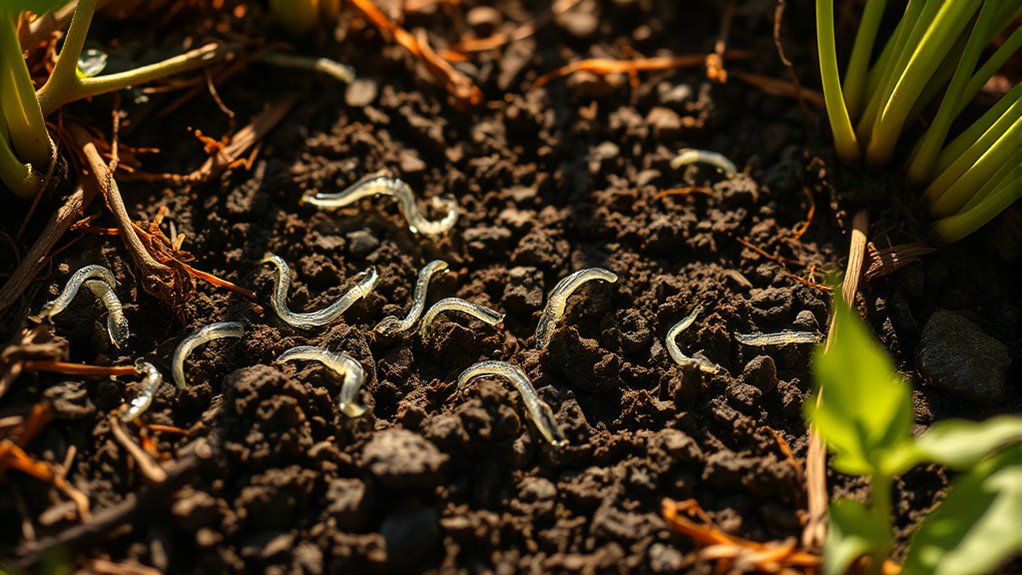Beneficial nematodes are tiny, natural worms that hunt down soil-burrowing pests like grubs, beetle larvae, and root maggots, helping you protect your garden without chemicals. You apply them as a liquid to moist soil; they then move through the ground to infect and kill pests beneath the surface. These beneficial creatures support a healthier, pesticide-free environment, encouraging thriving plants. Want to discover how they can keep your garden pest-free naturally? Keep exploring to learn more.
Key Takeaways
- Beneficial nematodes are microscopic worms that naturally control soil pests like grubs and root maggots without chemicals.
- They are applied as a liquid to moist soil, where they seek out and infect pest larvae underground.
- Using nematodes offers a sustainable, long-term pest management solution that supports soil health and ecosystem balance.
- They reproduce within pests, providing ongoing pest suppression and reducing the need for chemical pesticides.
- Beneficial nematodes improve soil structure, promote healthy plant growth, and help maintain a resilient garden environment.

Beneficial nematodes are microscopic worms that naturally help control soil-dwelling pests without the use of chemicals. When you introduce these tiny allies into your garden, you’re adopting an eco-friendly pest control strategy that targets pests at their source. Unlike chemical treatments, beneficial nematodes seek out specific pests, such as larvae of beetles, grubs, or root maggots, penetrating their bodies and killing them efficiently. By doing so, they help reduce pest populations naturally, minimizing the need for harmful pesticides that can harm beneficial insects, pets, and even your soil’s health.
Beneficial nematodes naturally control soil pests without chemicals, supporting healthy, resilient gardens.
Using beneficial nematodes is straightforward. You simply apply a liquid suspension to moist soil, ensuring the environment is suitable for their survival and activity. Once introduced, they move through the soil, seeking out pests to infect. This process is highly effective because it targets pests underground where chemical residues often can’t reach. As a result, you’re not only managing pests but also supporting the soil’s overall health. Healthy soil is essential for vigorous plant growth, and by reducing pest damage through biological control methods, you’re fostering a more resilient garden ecosystem.
Incorporating beneficial nematodes into your pest control strategies also offers long-term benefits. Unlike chemical solutions that may kill off beneficial insects or create resistant pest populations, nematodes establish a natural balance in the soil. They reproduce within infected pests, leading to ongoing pest suppression over time. This makes them a sustainable choice for maintaining a pest-free garden year after year. Plus, because they are natural organisms, they break down harmlessly in the environment, leaving no toxic residues behind.
Another advantage of using beneficial nematodes is their ability to enhance soil health. When pests are kept in check, plants experience less stress and damage, leading to healthier, more vigorous growth. Furthermore, nematodes can help improve soil structure by encouraging a diverse community of microorganisms. This diversity optimizes nutrient cycling and aeration, creating a thriving environment for roots and beneficial microbes alike. As you focus on pest control strategies that include beneficial nematodes, you’re actively contributing to soil health enhancement, which benefits your entire garden ecosystem.
Frequently Asked Questions
Are Beneficial Nematodes Safe for Pets and Children?
You’re wondering if beneficial nematodes are safe for pets and children. Rest assured, they’re generally safe because they target soil-dwelling pests and don’t pose risks to humans or animals. For pet safety and child safety, follow label instructions carefully and avoid direct contact during application. Once they’re mixed into the soil, they won’t harm your loved ones, making them a natural, effective pest control option.
How Often Should I Apply Beneficial Nematodes?
You should apply beneficial nematodes every 2 to 4 weeks during the active pest season. The application frequency depends on pest pressure and environmental conditions. The ideal timing is when soil and weather are moist, typically early morning or evening, to guarantee nematodes thrive. Regular applications help maintain control, so monitor pest levels and adjust the schedule accordingly for the best results.
Can Beneficial Nematodes Control All Types of Garden Pests?
Beneficial nematodes are effective against many pests, but their pest specificity means they don’t target all garden pests. You should know that nematode limitations exist; they mainly attack soil-dwelling insects like grubs, beetles, and larvae. They won’t control pests that live above ground, such as aphids or caterpillars. So, while they’re a great tool, you’ll need to combine them with other methods for all-encompassing pest control in your garden.
Do Beneficial Nematodes Work in All Soil Types?
You might wonder if beneficial nematodes work in all soil types. Soil compatibility can impact nematode efficacy, as they thrive best in moist, loose soils with good organic matter. In heavy clay or sandy soils, their effectiveness may decrease because they struggle to move or survive. To maximize results, consider your soil conditions and possibly amend your soil or choose nematodes suited for your specific soil type.
Are There Any Plants That Are Incompatible With Nematode Use?
You might think no plant is off-limits, but some are less compatible with beneficial nematodes due to soil restrictions and plant compatibility issues. For example, plants in extremely sandy or highly alkaline soils might not support nematode effectiveness, making it like trying to fit a square peg in a round hole. Always check your plant’s compatibility with nematodes to guarantee your garden’s natural bodyguards work their magic without a hitch.
Conclusion
Imagine your garden’s soil as a bustling battlefield, where tiny warriors—beneficial nematodes—hide beneath the surface, silently patrolling for pests. With each step you take, you invite these microscopic bodyguards to work tirelessly, turning your garden into a thriving sanctuary. Their unseen presence transforms chaos into harmony, protecting your plants like loyal sentinels. Embrace these natural defenders and watch your garden flourish, a vibrant tapestry woven with life, resilience, and the quiet strength of nature’s smallest heroes.









